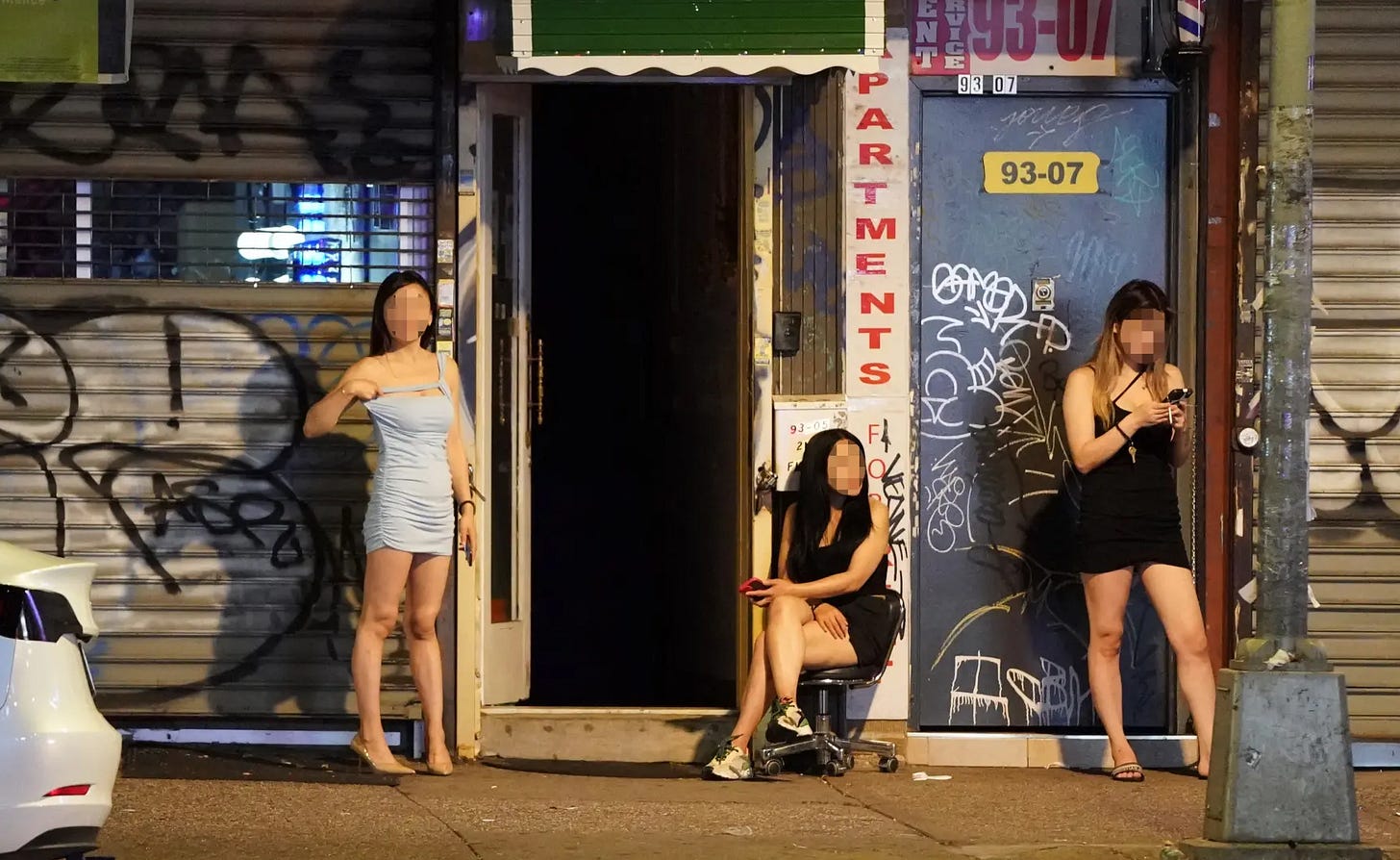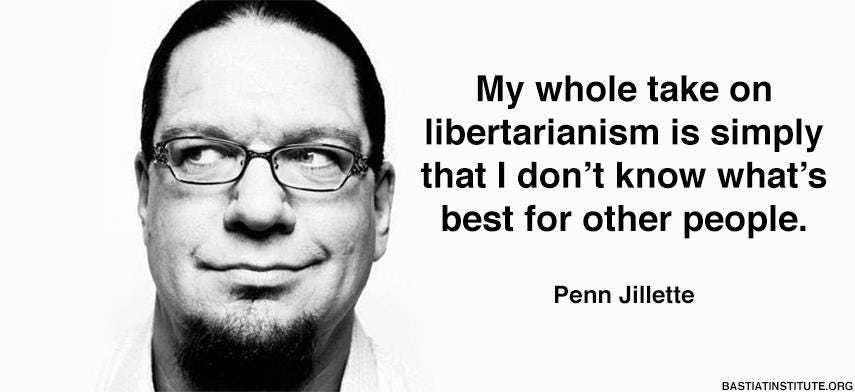Editor’s Note: A version of today’s bit, titled “Human Trafficking Turned On Its Head,” was originally published February 2016, at The Roots of Liberty.
The world’s oldest profession got a fresh fifteen minutes of fame recently, when a stretch of street in Corona, Queens, NY, dubbed “The Market of Sweethearts,” caught the attention of the New York Post, and in turn NYC Mayor Eric Adams.
I flashed back to a hullabaloo from a few years back, when Amnesty International released a policy paper calling for the global decriminalization of prostitution as the best way to “respect, protect, and fulfill the human rights of sex workers.”
I’ve grown accustomed to protestations against legalization of sex work, along with calls for greater restrictions or outright bans on pornography, from the Right. No matter that the Iron Law of Prohibition applies just as well to the world’s oldest profession as it does to recreational drugs, and no matter that it remains the world’s oldest profession despite countless efforts to ban it.
A segment of the Left, as well as one wing of feminism, views sex work as a matter of women’s rights and wants it legalized. However, when everything in that world is viewed as an oppressor/oppressed duality, many purportedly liberal people denounce prostitution. Worse, they falsely conflate all prostitution with human trafficking, and such luminaries as Lena Dunham, Anne Hathaway, and Meryl Streep have deemed sex work as “gender apartheid.”
Hyperbole is never in short supply in those quarters, dontchaknow…
Prohibitions, no matter how well intentioned, and no matter how nobly propounded, don’t work, and they often make things worse.
As a matter of public policy, the criminalization of prostitution has been about as effective as the criminalization of alcohol and narcotics. That is to say, it’s been a dismal failure. While strict enforcement in places like New York City managed to push streetwalkers into the shadows for a while, they just switched to other means, the rise of the Internet has made it easier than ever for prostitutes and johns to connect.
As a matter of public good, the criminalization of prostitution mirrors that of alcohol and drugs. The trade gets pushed underground, where participants, willing or unwilling, are more vulnerable to predation and have no legal recourse if wronged.
Libertarians have long argued against the criminalization of prostitution from both principled and practical positions. We not only believe that it is a violation of people’s individual rights to prohibit consenting adults from trading sexual services for compensation - you should be able to sell anything you can give away - but also that it’s both harmful to those who engage in such transactions and futile to try and stop them. Amnesty’s position reflects the latter, recognizing that the best way to protect people who are going to do this anyway is to offer them the recourse and protections that above-board workers and businesses enjoy.
Liberal opposition to prostitution also seems at odds with the basic premises espoused in the “my body, my choice” pro-abortion-rights campaign and in the message of female empowerment in general. While there is a camp within feminism that is pro-prostitution, the louder voice emanating from that world is that prostitution is the product of a patriarchal society, is therefore demeaning and disempowering, and so even the most informed and self-aware women should be debarred from practicing it. The irony that this attitude itself is paternalistic is obviously lost on those who think this way.
We also witness the inconsistency of opposition to sex work in the “exception” carved out for pornography. It’s not legal to receive money for sex – unless someone with a camera records it and then sells the recording for money. It’s also legal for a woman to get herself a “sugar daddy,” perhaps because it’s harder to prove the quid pro quo of gifts for sex in an on-going relationship/transaction. While anti-prostitution crusaders might bristle at porn and sugar babies, I doubt they have much chance of derailing either practice. With “tubing” sites such as Pornhub and the content-creator-centric site OnlyFans piping bucketfuls of money from consumers to performers, it really is laughable to make a distinction between performative sex work and individual sex work.
Legalizing prostitution would not only make things better for sex workers, it would benefit the fight against human trafficking:
It would free up resources currently consumed in combating consensual copulation for cash.
It would bring the industry above-board, meaning that women could turn to law enforcement or the civil court system if they are abused or stolen from. The pimping industry would wither away.
The introduction of health standards and inspections and other regulations - ubiquitous wherever prostitution is legal (see: Nevada, The Netherlands, Australia, New Zealand, Indonesia, Mozambique, Turkey, Eritrea, Sierra Leone, Greece, Hungary, Germany, Switzerland, Uruguay, Bolivia, Peru, Ecuador, Colombia, and Venezuela) - would benefit sex workers and consumers.
It would be easier to protect minors and rescue them from traffickers and other abusers.
It would make it easier to rescue undocumented people from being trapped in and coerced into sex work.
I must reiterate a point I’ve made many times when arguing against prohibitions: Allowing is not condoning.
Just as you can argue the perils of tobacco without banning it, and just as you can denounce recreational drug use without insisting it be illegal, you can reject prostitution and argue against people participating in it without demanding hookers or johns be prosecuted. Rebutting legalization with “would you want your daughter to be a sex worker?” or some other form of “gotcha” misses this point. An adult of sound mind must be free to do things that you or I might dislike or personally reject. That’s the libertarian way:
I wonder how many prostitutes on the Market of Sweethearts are illegals (undocumenteds, if you prefer) being coerced into “working off” their price of passage into the US or otherwise locked into doing things they don’t want to do. This is trafficking, it’s happening in the plain light of day, and the trafficked have little or no recourse given that the work they do can get them thrown in jail if they go to the authorities.
Of note: The UN is in NYC these days, engaging in one of its typical (forgive me) circle-jerks while scolding us for the temerity of wanting liberty. And causing gridlock, of course. And, apparently, contributing to the economy in true Best-and-Brightest fashion. That is to say, the escort business is booming, so much so that “talent” has flown in from Vegas and Europe to meet the high demands for “service” amongst the diplomats and other luminaries. As always, a different set of rules for them.






Another great column! However, what about the point that legalizing something makes it more likely to be engaged in?
Technically, prostitution is the world's 2nd oldest profession. Agriculture is #1.